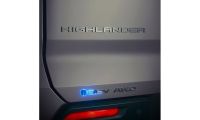I should start my review of the 2011 Chevrolet Volt by pointing out that I am a gearhead and I put very little priority into the area of fuel economy when buying a vehicle. I own 4 vehicles with V8 engines under the hood and the best of them gets around 18mpg so in the past I have not had a world of interest (or enthusiasm) over electric vehicles – especially when they so greatly limit your ability to travel any fair distance. While the Chevrolet Volt features emission-free, all-electric driving for short trips, the gasoline engine can allow the Volt to make long trips. Therefore, owners can have the luxury of driving without using any gasoline on shorter trips but say that you need to make a 250 mile round trip drive – the Volt can do that too. Most importantly, the 2011 Chevy Volt offers the freedom of a traditional vehicle with the “green” qualities of an electric vehicle in great looking package with an interior that is roomy and comfortable.
First of all, a rundown of just how the drivetrain of the 2011 Chevrolet Volt functions. Many people understand that the Chevy Volt is powered by an electric drive system featuring an electric drive motor powered by a high tech battery. Just like other electric vehicles, the Volt can drive around on purely electric power with an EPA estimated range of 35 miles but unlike the competition (like the Nissan Leaf), the Volt also features a 1.4L gasoline engine that kicks in to extend the range to that of a traditional vehicle when the battery is depleted. However, many consumers believe that when the Volt battery is dead, the gas engine fires up and powers the car like any other gas-powered car on the road and that is not at all the case.
The 1.4L gasoline engine in the 2011 Chevrolet Volt works strictly as a generator system, engaging to charge the battery when electric levels drop below a reasonable level. In other words, the 4-cylinder engine in the Volt never sends power to the wheels like a traditional vehicle, via a manual or automatic transmission but instead the engine creates electricity that is used to power the electric drive system. At times of extreme load on the drivetrain, the power created by the gas engine is pumped directly to the drive system while, at other times, the engine engages to continually send power to the battery in conjunction with the regenerative braking system.
Thanks to the design of the propulsion and charging system in the 2011 Chevrolet Volt, the engine does not run all of the time once the battery level has hit 0 miles. Through the use of the regenerative braking system and the 1.4L gas engine that functions more as an on-board generator, the battery is constantly being charged when driving and this system only sends power to the drivetrain under acceleration. Unlike a traditional vehicle that is still burning gasoline when coasting down a hill because the engine is idling, when the Volt is coasting down a hill it is not using any gasoline or electricity – instead using the high tech systems to make new electricity.
Say that your battery is depleted while driving the Volt on the highway. The gasoline engine kicks in and begins sending new juice to the battery system but when you come to a long, downhill grade where you are not accelerating at all, the engine shuts back off and the battery is charged by the braking system. As you get to the bottom of this hill and have to accelerate again, the engine does not kick in immediately as the drive system instead uses the power gained while coasting down the hill. Once the energy creating while coasting is depleted, the engine will then kick in again to charge the system but with the engine constantly cycling on and off (which is hard to detect from inside the car), the system is always working on conserving gasoline by creating new electricity for the drive system.
Simply put, when the battery of the 2011 Chevrolet Volt is “dead” during longer driving trips, the car is always still moving under electric power while the gasoline engine only kicks in when more juice is needed in the battery system.
All of that aside, the 2011 Chevrolet Volt is wonderfully user friendly. There is no “switch” to flip or anything else to make the system function properly and shy of plugging itself in, the Volt does everything for you. The transition from all-electric power to range-extended power with the help of the gasoline engine is completely seamless, to the point that it can be hard to tell at times if the engine is running or not. When driving around town at lower speeds, even when the battery was drained of plug-in power, the engine is hardly ever running so should you get stuck in traffic there is no real concern of wasting gas while you are sitting there… and the benefits of this system are very clear.
Over the course of my 8 days driving the Chevy Volt, I drove a total of 590 miles and when I filled the gas tank before returning the car, I put in just 5.4 gallons of premium gasoline – bringing about an incredible average of 109 miles per gallon. On top of that, it seems very clear that someone who lives in an area with lower speed limits (or someone who isn’t such a lead foot) could easily best the fuel economy levels that I saw during my time with the Volt.
How exactly did I get 109mpg from a vehicle that is only rated at 93MPGe? During my 8 days driving the Chevy Volt, I had 5 days where my daily commute did not exceed the battery range so I didn’t use a drop of gas. On those days, I drove anywhere from 38 to 43 miles without the gasoline engine engaging and during the first three days, I didn’t have any idea what the gas engine might sound like. Each night, I used the 120v charging system that plugs into my house and in ten or so hours later, the Volt was fully charged. Even on evenings when we were out until 10 or 11pm, the Volt was charged and waiting by the time I was ready to head out the next morning and thanks to this, my regular tasks around town were done entirely emission free.
The first big test for the Volt was a 119 mile drive on my 4th day with the car, during which I used 1.6 gallons of gas (the Volt’s driver information center tells you exactly how much gas you are using when the engine is running) for an average on that trip of 74.4 miles per gallon. This is a far cry from the 109mpg that I got over the course of the week but the majority of this 119 mile trip was at highway speeds ranging from 75-85 miles per hour (I also found out that the Volt will indeed go 100 miles per hour). I drive this same trip several times a week in my own vehicles and I drove the Volt just like I would my own truck or car – no light footed driving or hypermiling in an effort to get incredible fuel economy. At 75 miles per hour, the Volt is beyond its peak efficiency range (again, the info center lets you know how efficiently you are driving) so I suspect that for someone who lives in an area where they have lower highway speed limits, there fuel economy/electric range of the Volt would be even greater. The important part for me was that the Volt was very willing to travel at 75-85mph to keep up with Detroit highway traffic and best of all, I got 74 miles per gallon while doing it. I made this trip two more times while driving the Volt with similar efficiency results each time. It should be pointed out that the all-electric Nissan Leaf wouldn’t be able to make this trip as it is beyond the electric range and the Leaf has no range-extending engine.
So the 2011 Chevy Volt gets great mileage and offers an impressive all electric range but how is the drive, you ask? It is my belief that if you equipped the Volt with some sort of sound system that made it sound like a traditional car all of the time (IE, adding engine noises), the average consumer couldn’t tell the difference shy of the lack of transmission shifts. Throttle response is every bit as direct as any other modern vehicle and due to the instant torque of the electric drivetrain, the Volt can actually get up and go pretty quickly (and it provides enough power to spin the tires). I didn’t have a chance to take it to the dragstrip but reports indicate that the Volt can run through the quarter mile in the mid 16 second range… just in case any prospective Volt buyers are worried about the quarter mile performance. At no point did I have any issue keeping up with traffic and when you feel the need for speed, the Volt’s drivetrain is happy to climb up near the century mark – although it doesn’t do any favors for your fuel economy. That being said, the key point here is that the Chevy Volt does not require the driver to compromise performance in the name of fuel economy. Also, thanks to the weight balance efforts of the electric propulsion and battery system, the Volt handles very nicely with a smooth, quiet and comfortable ride around town and on the open road; while also being able to handle the turns surprisingly well. Is it going to double as a road race car? Probably not, but I would say that the Volt handles much better than many similarly sized sedans on today’s market and overall, it is a fun car to drive and that is what impressed me the most.
The 2011 Chevrolet Volt offers something that no other car currently available in the US does – offering over 40 miles of emission free driving with a range extending engine that allows for an endless range (when refueling) so this can truly be someone’s only vehicle. The Volt makes a fantastic shorter-range commuter vehicle regardless of the type of driving, while also being able to make a 400 mile trip without any concerns on the driver’s end. The front seats move enough to accommodate someone who is very tall with plenty of leg, head and elbow room. In the “hatch” area, there is a surprising amount of cargo space with more than enough room for a hefty weekly family shopping trip and while the center console that runs the length of the interior will prevent you from seating three people in the back, the rear seating area will comfortably seat two children or adults.
While the $41,000 price tag for the 2011 Chevrolet Volt may raise some eyebrows as it is pricier than the Nissan Leaf, buyers should keep in mind the $7,500 tax credit that comes with buying the Volt. Buyers should also keep in mind that, unlike the Leaf, the Volt will never limit your range of travel while unlike the popular Toyota Prius, the Volt offers all-electric driving for those who don’t venture beyond 40 miles a day. Price aside, the 2011 Chevrolet Volt is worth every bit of attention it has received over the past year - combining the emission free driving of an electric vehicle with the endless range of a traditional sedan - and it does so in a way that really makes driving it no different than any other modern vehicle on the market. if you are in the market for a mid-sized sedan with incredible fuel economy capabilities, the Chevy Volt should be on your short list as thanks to the Volt, driving an electric car no longer requires you to sacrifice in range or real world driveability.
Dare I call the Chevrolet Volt the perfect electric car? Until someone comes out with a better design - the Volt is just that.
Other GM News:
GM resurrects the 1969 Holden Hurricane
The first new Chevrolet Malibu is built in Korea
GM says no 2013 Chevrolet Trailblazer for the US market
GM introduces the incredible 2013 Chevrolet Camaro ZL1 Convertible
Video of the 2012 Chevrolet Camaro ZL1 tearing up the Nürburgring
The Camaro ZL1 stakes its claim as a supercar on the Ring
Set as google preferred source












Comments
Fantastic article. I leased a
Permalink
Fantastic article.
I leased a Volt one month ago. I have put 2000 miles on it. A couple of other insights you and readers of the article may find useful:
1. There are now charging stations that somewhat convenient to my driving patterns (Ann Arbor, Ypsilanti, Detroit, Livonia, Northville). A ninety minute charge in any of these locations would boost the daily range of the vehicle from about 37miles to perhaps 50. The stations I mention are all free... and the parking in some of locations is free (a double benefit).
2. There is a sport mode. I am not sure if you used that. I have not used it much... but when I do, it noticeably makes the car peppier.
3. A company called SPX, DTE (an energy company) and the Department of Energy have partnered up to offer free 220V chargers (up to a $2500 value).
4. My Volt lease payment is about $160/month more than a comparable new lease on the car I traded in (an Impala). However, based on the first month's data, I am expecting to save almost that same amount in fuel. Bottom line, same amount of money.... but it is going to US Bank (the leasing company) instead of Exxon/Mobil, BP or Shell.
I love the Volt, but please
Permalink
I love the Volt, but please don't call it a mid sized car. The Volt is a compact car. It is even smaller inside than its Chevrolet Cruze cousin. I say this because I cannot fit my family in the Volt (four tall people). If everyone calls it mid size, then nobody will build a real mid size vehicle of this type. Great first step GM, but it is a first step. I eagerly await a larger version of this vehicle.
I love my Volt. My husband
Permalink
I love my Volt. My husband and I bought one about six months ago. We drive in everywhere and we have had great gas mileage. We recently took it on a long trip, about 1600 miles and only spent about $80.00 in gas. It handles very well. Even sports car owners are impressed with it's ability to go quickly. After driving the Volt, I would not have any other car.
Great article and thanks for
Permalink
Great article and thanks for doing your homework. As a Volt owner for over 7 months now the one nitpick I would have is that you state that the gas engine "never" sends power to the wheels and this isn't actually true. The first Volt owners received a gift along with their Volt and it was a book on the history of the Volt and a Volt flip camera. In the book they state that there are approximately 7 instances where it is actually more efficient for some of the power from the gas engine to be applied to the wheels. They don't list all 7 instances in the book but the most common one is when you are in Charge Sustaining (CS) mode and you are going over 70 mph.
Funny enough this was not received very favorably by some EV purists but I personally want the Volt to be as efficient as possible and if that means, on rare occasions, for the gas engine to power the wheels, I'm good with that.
Anyway, over 9,000 miles now at nearly 300 mpg and just loving the Volt. And yes, it is a compact car. I have two kids under 5 and so it's not much of an issue for me but at 6 ft I don't think I would want to sit back there too much.
I can add my experience, I
Permalink
I can add my experience, I have had my volt for one and a half month and I cant praise it enough. I would say it more of a mid-size car than a compact. But not really a full sedan. But works fine for my family of 4 and a dog.
My two daughter ride in the back in car seats, I can also have the dog a large Golden Retriver in the back. The utility of this car is great and love how it drives. I am biased towards german cars like Audi and BMW and my volt is right up there with those cars when it comes to having fun while driving.
A great side effect we had was that it has replaced or passat station wagons as the pirmary faimliy vehicle which was not the intention. But it has saved us even more money the first month. We drove it about 1500 miles on 10 gallons of gas. With the mpg on my old car it reduced our gas consumtion with an amazing 50 Gallons the first month, way more than I expected. So in dollars it saved us $155 dollars. Thats $185 (Gas at 3.70) - $30 for electricity. This is with having fun driving, even a lot of floring it at red lights. No other car can even get close.
As a european I never thought I would give this much praise to an american and a chevy, but boy was I wrong.
I have had my Volt since
Permalink
I have had my Volt since December 18, 2010 and now have over 15,700 miles on it.
My lifetime fuel economy is 142 miles per gallon.
I drive 46 miles round trip to work each day and am able to charge while at work.
I also make longer trips monthly from Los Angeles to San Francisco, Santa Barbara, Lake Arrowhead and Palm Springs.
I have recorded MPG of 39-41 while driving at freeway speeds with the gas engine running, after the electric range is exhausted.
So far the Volt has exceeded my expectations in terms of driving comfort, fuel economy and performance.
Sport mode is especially thrilling!
As I have posted before on other sites, I think GM has hit a home run with this car and set a bar that is quite high for a first generation mass produced American electric vehicle.
Note that the high performance Fisker Karma at $100,000 doesn't get nearly as good EPA EV range or MPG with engine running.
Thanks for writing a well informed article on the Volt. It deserves press that actually represents the car as current owners are experiencing it.
Not a bad review, but
Permalink
Not a bad review, but everyone here is making the same mistake regarding fuel mileage. The volt calculated lifetime fuel mileage is fictitious. They calculate the fuel mileage by dividing the number of miles you have driven by the amount of gasoline you have used. If the Volt were a pure gasoline engine vehicle or a gasoline only hybrid like the Prius the calculation would make sense. However, if you use that calculation you are ignoring the fact that the electricity is not free energy that somehow descends from heaven and infuses your car with its holiness. If you want to calculate your MPGe while in electric mode, divide the number of miles driven by the energy used (in kWh), and multiply that by 33.7kWh/1gallon (the energy contained in a gallon of gasoline). The EPA uses an estimate of 36kWh per 100 miles which yields the 94MPGe. The calculation is shown at this point in a youtube video http://www.youtube.com/watch?v=zYbQDHdgvdY&feature=player_detailpage#t=64s. On a recent trip I drove 51.8 miles on 12.5 kWh (had a partial charge which extended the range of electric only travel), which calculates 51.8/12.5*33.7=139.6MPGe for that 51.8 miles, followed by 103 miles on 2.77 gallons for 37.2MPG. This results in a combined MPGe of 49.3, not 55.9 which would be the calculation based on the gasoline only (12.5/33.7=0.37 gallon equivalent+2.77 Gal=3.14 gallon equivalent, 154.8m/3.14g=49.3MPGe)
Nice article, but it is
Permalink
Nice article, but it is technically wrong as your statement about the gas engine only being used to generate electricity is not true, this according to GM.
Sidney: correct. the Volt
Permalink
In reply to Nice article, but it is by Sidney (not verified)
Sidney: correct. the Volt runs completely on electricity until 60% of the battery capacity is depleted and then the engine kicks on to run the generator. Once the engine is running, above about 70 MPH the engine engages a planetary gear system to assist the electric motors in driving the car. This system results in a 10-15% increase in efficiency at higher speeds. reference: media.gm.com/content/dam/Media/documents/US/Word/101010_volt_launch/Drive_Unit.doc
(BTW, it takes a while for this document to load. be patient)
The reasons why smart people
Permalink
The reasons why smart people do not buy Electric or Hybrid cars are: Batteries are expensive, short lived, efficiency isn’t 100 % and the electricity is not free. Going electric you won’t decrease Air Pollution because 50 % of the electricity is produced by burning COAL. By the way a Jetta Diesel, TDI for $23000 makes 40MPG. With a full tank of Chevy Volt, driving non-stop, you make 37MPG, plus $3 or more, the price of electricity you charged 16.0-kW-hr lithium-ion, the hefty 750-pound battery pack.
Anonymous: I am sorry, but
Permalink
In reply to The reasons why smart people by Anonymous (not verified)
Anonymous: I am sorry, but you are mistaken. 1) The Volt only uses the battery for 10.4 kWh of the 16.9 capacity, and for that I get 30-48 miles (very cold and mild weather.) My electricity cost to charge the full 10.4 (plus 10% lost in charging process) in the Volt is under 70 cents at non-summer rates in St. Louis, $1.25 at summer rates. 2) The Volt battery is under warranty for 8 years or 100,000 miles. There are thousands of first generation Toyota Prius cars still on the road still running on their original batteries or with only minor repairs (individual cells can be replaced for minimal cost: roughly $20 each plus labor). 3) The main battery in the Volt weighs 435 pounds, not 750, but it IS a battery PACK, not a solid chunk that must be replaced en-masse. 4) CO2 emission produced by burning coal for 50% electricity generation is lower than the CO2 emission from a fossil fuel only vehicle. 5) I am about to install solar panels, so my cost of charging will drop as I sell power back to the utility and my CO2 emissions will approach zero 6) diesel fuel costs more than gasoline, so there is added expense there. 40 MPG is cost equivalent to 35mpg in a gasoline with higher smog emissions. 6) Fuel based cars are STILL running on foreign oil, which does not reduce our vulnerability to volatile geopolitics. 7) The military, life, and tax consequences of fighting wars to protect our oil interests are a hidden cost of driving diesel or gasoline only cars. 8) 90% of my lifetime miles have been on electricity. 9) oil changes are once every 25,000 miles or 2 years in the Volt. 10) brakes may never need to be replaced or major service performed because regenerative braking recharges the batteries and the friction brakes are rarely used. Finally, I wanted a US name car made in America, comparable in ride and features to my Cadillac CTS. The Volt did that and saved me $212 in fuel costs in December alone over 1570 miles